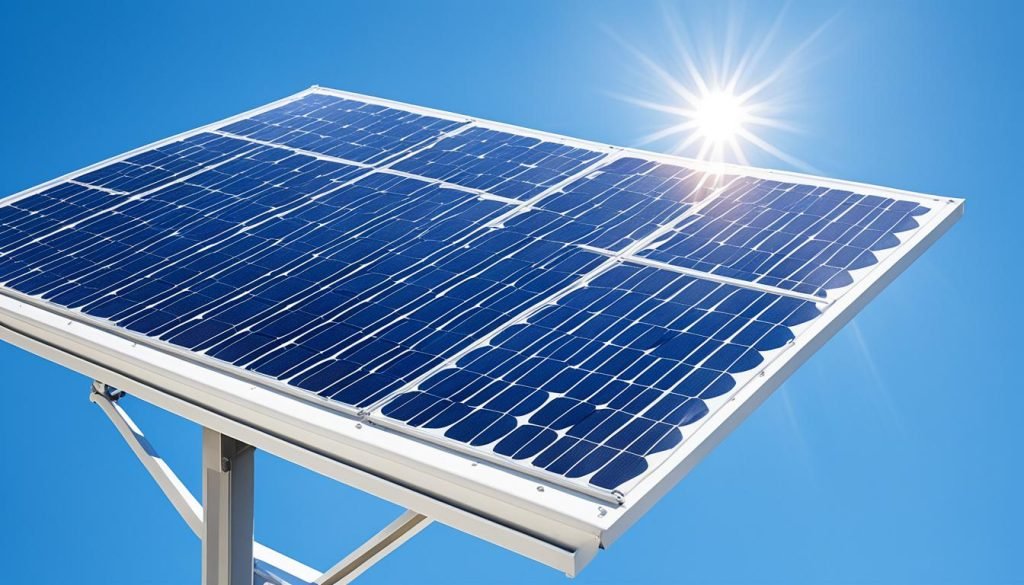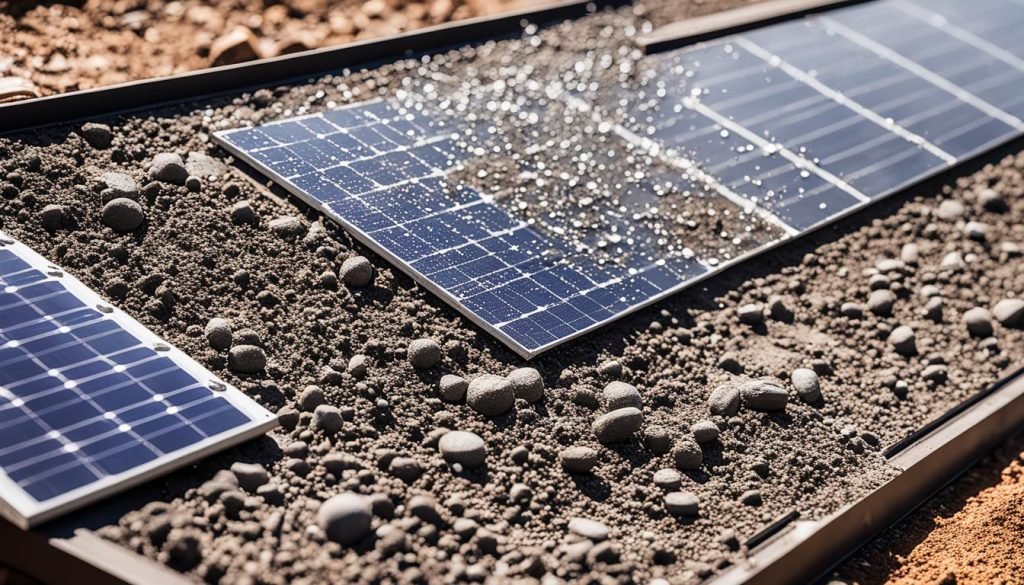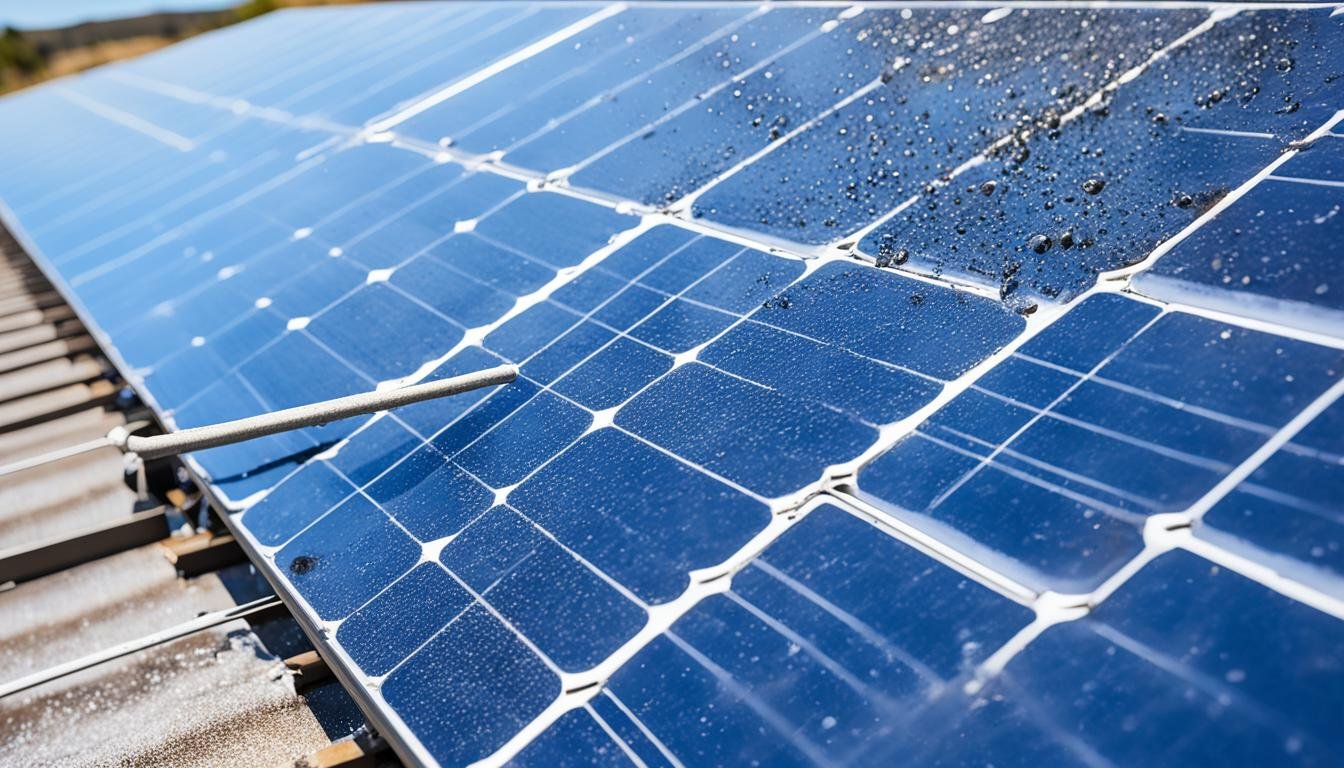Did you know that dirty solar panels can reduce their efficiency by up to 30%? That’s a significant loss in potential energy production, considering the increasing reliance on solar power for sustainable energy solutions. To ensure your solar panels operate at their peak performance and maximize energy output, regular cleaning and maintenance are essential.
In this article, we will provide expert tips and advice on solar panel cleaning and maintenance. We will explore the importance of regular inspections, the benefits of professional maintenance, and the role of monitoring systems in ensuring optimal performance. By following these tips, you can enhance the longevity and effectiveness of your solar panels.
Key Takeaways:
- Dirty solar panels can reduce efficiency by up to 30%.
- Regular cleaning and maintenance are crucial for optimal performance.
- Professional maintenance services can ensure thorough cleaning and repairs.
- Monitoring systems help track efficiency drops and prompt action.
- Choose the right cleaning equipment and avoid harsh chemicals.
The Importance of Regular Solar Panel Inspections
Regular inspections are crucial for ensuring the optimal performance and longevity of your solar panels. By conducting regular visual inspections, you can identify potential damage at an early stage, preventing it from escalating into more serious issues. These inspections play a vital role in maintaining the efficiency and effectiveness of your solar panel system.
Identifying Potential Damage Early
During regular solar panel inspections, it is important to visually inspect the panels for any signs of damage. This includes checking for cracks, chipping, or loose connections. Identifying these issues early on allows for prompt action and necessary repairs, preventing further damage and ensuring the continued functionality of the system.
Regular inspections are crucial for identifying potential cracks, chipping, or loose connections, allowing for prompt repairs to maintain the optimal functionality of your solar panels.
Professional technicians are equipped with the expertise to conduct comprehensive checks during inspections. Their knowledge and experience enable them to identify any potential damage that may not be immediately visible to the untrained eye. Engaging the services of a professional ensures thorough inspections that leave no room for oversight.
Monitoring for Efficiency Drops
In addition to visual inspections, monitoring systems play a vital role in maintaining the efficiency of your solar panels. These systems track the performance of your solar panel system, enabling you to monitor the output and identify any drops in efficiency. By constantly monitoring your system’s performance, you can take timely action to address any efficiency issues that may arise.
Monitoring systems provide real-time data on the output of your panels, allowing you to track their performance and assess their efficiency. They help you identify potential issues before they significantly impact the overall energy production of your solar panel system.
| Benefits of Regular Solar Panel Inspections and Monitoring Systems |
|---|
| Early identification of potential damage |
| Prevention of further damage |
| Timely repairs to maintain optimal functionality |
| Real-time tracking of efficiency |
| Prompt action to address efficiency drops |
Professional Solar Panel Maintenance for Peak Performance
Ensuring the optimal performance and longevity of your solar panels requires professional maintenance. By hiring qualified solar technicians, you can benefit from their expertise in performing thorough cleaning, repairs, and maintenance tasks that keep your panels operating at their best.
Professional solar panel maintenance offers several advantages:
- Expertise: Qualified technicians have the knowledge and skills to effectively maintain and troubleshoot solar panels. They are trained in identifying potential issues and implementing the necessary solutions to ensure peak performance.
- Thorough Cleaning: Professionals use specialized equipment and cleaning techniques to remove dirt, dust, and other debris that can hinder solar panel efficiency. By keeping the panels clean, they can optimize energy production.
- Repairs and Replacements: In the event of damage or faulty components, professional technicians can promptly address the issues. They have access to genuine spare parts and can perform repairs or replacements safely and effectively.
- Prolonged Lifespan: Regular maintenance by professionals helps extend the lifespan of your solar panels. By addressing potential problems early on and implementing preventive measures, you can avoid costly repairs or premature panel replacements.
By investing in professional solar panel maintenance, you can enjoy the benefits of increased energy production, improved efficiency, and long-term savings. Trusting experts to care for your solar panels allows you to focus on enjoying the sustainable benefits of clean energy.
To illustrate the importance of professional maintenance, consider the following table showcasing the key advantages:
| Advantages of Professional Solar Panel Maintenance |
|---|
| Expertise in identifying and solving potential issues |
| Thorough cleaning to optimize energy production |
| Prompt repairs and replacements for damaged components |
| Prolonged lifespan, reducing the need for costly repairs or replacements |
Benefits of Solar Performance Monitoring Systems
Solar performance monitoring systems are essential tools for optimizing the efficiency of solar panels. By providing real-time output tracking, these systems enable homeowners to identify efficiency issues promptly and make informed decisions for maintaining optimal energy production.
Real-Time Output Tracking
One of the key benefits of solar performance monitoring systems is the ability to track the real-time output of solar panels. By monitoring the system’s performance, homeowners can quickly identify any deviations from expected energy production levels. This real-time tracking allows for immediate action to be taken, ensuring that efficiency issues are addressed promptly.
Quick Identification of Efficiency Issues
Efficiency issues can significantly impact the overall performance of solar panels. With solar performance monitoring systems, homeowners can easily identify any unexpected drops in energy output. This quick identification of efficiency issues allows for timely intervention, whether it’s cleaning the panels, addressing system malfunctions, or making adjustments to maximize energy production.
Clean Panels for Optimal Efficiency
Ensuring clean solar panels is crucial for maximizing energy production and maintaining optimal efficiency. The accumulation of dirt, dust, bird droppings, and other debris on the surface of solar panels can significantly impact their performance.
When dirt and debris cover the panels, sunlight cannot penetrate effectively, reducing the amount of energy that can be harvested. This leads to decreased power output and lower overall efficiency. To mitigate this, routine cleaning is necessary to keep the panels clean and free from obstructions.
Impact of Dirt and Debris on Energy Production
The presence of dirt, dust, and other debris on solar panels creates a barrier between the sun’s rays and the photovoltaic cells. This barrier prevents the panels from absorbing sunlight optimally, resulting in diminished energy production.
Furthermore, the accumulation of bird droppings, pollen, leaves, or other organic matter can cause shading, which leads to localized hotspots on the panels. These hotspots can damage the cells and reduce the overall efficiency of the entire panel.
Additionally, dirt and dust particles can create a film on the surface of the panel, reducing the light transmission and further compromising energy production. Over time, this can result in a significant decrease in power output.
The Necessity of Routine Cleaning
Routine cleaning is imperative to maintain the efficiency and longevity of solar panels. Regular maintenance helps prevent the buildup of dirt, dust, and debris, ensuring optimal energy production from the panels.
Areas with low rainfall or high pollution levels require more frequent cleaning due to the increased accumulation of dirt and pollutants on the panel surface. However, even in regions with ample rainfall, routine cleaning is still essential to remove any remaining dirt or residue that rainfall may not fully eliminate.
By incorporating routine cleaning into your solar panel maintenance plan, you can enhance the efficiency and overall performance of your solar power system. Regular cleaning helps maximize energy production, reduces the risk of damage to the panels, and extends their lifespan.

Solar Panel Cleaning: Techniques and Best Practices
Proper techniques and best practices are essential for effective solar panel cleaning. By following these guidelines, you can ensure that your panels remain in optimal condition and continue to generate clean energy efficiently.
- Choose the Right Tools: When cleaning your solar panels, use a soft cloth or sponge with water. Avoid abrasive materials, as they can scratch the panel’s surface and reduce its efficiency.
- Clean During Cooler Hours: It’s best to clean solar panels early in the morning or late in the evening when the temperature is cooler. This helps prevent water from evaporating too quickly and leaving behind streaks or residue.
- Gently Wipe the Panels: Wet the cloth or sponge with water and gently wipe the surface of the panels in a circular motion. Be careful not to apply excessive pressure, as this can damage the protective coating.
- Dry Thoroughly: After cleaning, use a clean, dry cloth to remove any remaining moisture from the panels. This helps prevent water spots and ensures a streak-free finish.
- Maintain Safety: Safety should be a priority when cleaning solar panels. Ensure that you have a stable platform to work from, use appropriate safety equipment (such as gloves and safety glasses), and follow any manufacturer guidelines or warnings.
Regular cleaning using these techniques and best practices will help maximize the efficiency and lifespan of your solar panels. By maintaining clean and well-maintained panels, you can enjoy optimal energy production and contribute to a greener environment.
Pros and Cons of Different Solar Panel Cleaning Techniques
| Technique | Pros | Cons |
|---|---|---|
| Soft Cloth/Sponge and Water | Gentle on panel surface, effectively removes dirt and debris | May require more time and effort, not ideal for heavily soiled panels |
| Automated Cleaning Systems | Efficient and time-saving, suitable for large-scale installations | Higher upfront cost, may not be suitable for all panel types |
| Pressure Washing | Quick and effective for stubborn stains | Requires professional expertise to avoid panel damage, potential water ingress |
| Avoiding Abrasive Materials | Prevents surface scratches, maintains panel integrity | May require additional cleaning steps for stubborn dirt |
Considerations for Choosing Solar Panel Cleaning Equipment
When it comes to maintaining the integrity of your solar panels, choosing the right cleaning equipment is essential. In this section, we will explore two important considerations – the use of soft brushes versus abrasive materials and the benefits of automated cleaning systems.
Soft Brushes Versus Abrasive Materials
When cleaning your solar panels, it is important to use the right tools to avoid causing any damage. Soft brushes are highly recommended for gentle and effective cleaning. These brushes are designed to remove dirt and debris without scratching or compromising the surface of your solar panels.
Avoid using abrasive materials such as harsh scrub brushes or abrasive sponges, as they can potentially scratch the protective coating of your panels. Scratches on the surface not only affect the aesthetics but can also impact the efficiency of your panels over time.
Remember, gentle cleaning with soft brushes ensures that your panels remain in optimal condition while maintaining their peak performance.
Automated Cleaning Systems
For larger or heavily soiled solar panel installations, automated cleaning systems can offer numerous benefits. These systems are designed to streamline the cleaning process and provide efficient and thorough results.
Automated cleaning systems use specialized brushes or sprayers that ensure consistent and effective cleaning across all your panels. They are capable of reaching remote or inaccessible areas of your installation, ensuring that every part of your panels receives the necessary attention.
These systems often utilize advanced technology and sensors to optimize cleaning efficiency and reduce water usage. They can also be integrated with monitoring systems to provide real-time data and allow for timely maintenance and adjustments.
Choosing the right solar panel cleaning equipment is crucial for maintaining their performance and longevity. Opt for soft brushes and consider automated cleaning systems to ensure effective cleaning without compromising the integrity of your panels.
The Risks of Harsh Chemicals on Solar Panel Surfaces
When it comes to cleaning solar panel surfaces, using harsh chemicals can cause more harm than good. These chemicals, such as ammonia-based solutions or abrasive detergents, can actually damage the protective coatings on solar panels, resulting in decreased efficiency and potential long-term problems.
It is important to understand that solar panels are designed to withstand regular exposure to various weather conditions, including rain and sunlight. However, using harsh chemicals can strip away the protective coatings that help solar panels maintain their efficiency and longevity.
By avoiding the use of harsh chemicals, you can ensure that your solar panels remain in optimal condition, maximizing their energy production potential.
When cleaning solar panels, it is best to opt for gentle cleaning methods that do not involve harsh chemicals. This includes using a soft cloth or sponge with plain water to remove dust, dirt, or debris from the surface of the panels.
It is also recommended to clean solar panels during cooler times of the day to prevent rapid drying and streaking. This will allow the panels to dry naturally without the risk of chemical residue or mineral deposits affecting their performance.
By following these precautions and avoiding harsh chemicals, you can ensure that your solar panels remain clean, efficient, and in optimal condition for years to come.
Environmental Variables Affecting Solar Panel Cleaning Frequency
When it comes to maintaining the efficiency and performance of your solar panels, it’s essential to consider various environmental variables that can impact their cleaning frequency. By understanding these factors, you can develop a more effective cleaning schedule to ensure optimal energy production.
Location-Specific Factors and Pollution Levels
The location of your solar panels plays a significant role in determining how frequently they need to be cleaned. Areas with high pollution levels, such as industrial zones or regions close to busy roads, can result in faster accumulation of dirt, dust, and other debris on the panels’ surface. Regular cleaning is necessary to remove these pollutants and maintain the panels’ maximum efficiency.
Additionally, factors such as proximity to construction sites, agricultural areas, or coastal regions can contribute to increased soiling of solar panels. For example, construction sites can generate dust and particles that settle on the panels, reducing their efficiency over time. Likewise, coastal areas may experience higher salt accumulation, which can negatively impact solar panel performance. Understanding these location-specific factors is essential for determining the appropriate cleaning frequency.
Seasonal Variations in Solar Panel Soiling
Another critical consideration for solar panel cleaning is the impact of seasonal variations on soiling levels. Throughout the year, different weather conditions and environmental factors can influence how quickly dirt and debris accumulate on the panels.
During dry seasons or in areas with low rainfall, panels may accumulate more dust and pollutants, requiring more frequent cleaning to ensure optimal performance. On the other hand, in regions with higher rainfall, the panels may self-clean to some extent, reducing the need for intensive manual cleaning.
Seasonal changes can also affect the type of soiling that occurs. For instance, springtime may bring an increase in pollen, while autumn may result in the accumulation of falling leaves. Being aware of these seasonal variations can help you plan your solar panel cleaning schedule accordingly.
To maintain the efficiency and longevity of your solar panels, it’s crucial to factor in these environmental variables, including location-specific factors and pollution levels, as well as the influence of seasonal variations on soiling. By understanding these dynamics, you can create a customized cleaning plan that ensures your solar panels operate at their peak performance level.

When to Engage Professional Solar Panel Cleaning Services
Engaging professional solar panel cleaning services may be necessary in certain situations. While some homeowners may choose to clean their own panels, there are instances where professional expertise is required to ensure optimal performance and safety. In this section, we will guide you on how to assess the accessibility and condition of your panels to determine if professional cleaning services are needed. Additionally, we will provide essential safety considerations for those who choose to clean their own panels.
Assessing the Accessibility and Condition of Panels
Before deciding whether to hire professional solar panel cleaning services, it’s crucial to assess the accessibility and condition of your panels. Factors to consider include:
- The location of the panels: Are they easily reachable or situated in a challenging location?
- The size and number of panels: Do you have a large array of panels that may require specialized equipment and expertise?
- The angle and tilt of the panels: Will cleaning them involve climbing on a roof or using ladders?
- Any physical damage or defects: Are there noticeable cracks, chipping, or loose connections that may require professional attention?
By evaluating these factors, you can determine if the accessibility and condition of your panels warrant professional cleaning services.
Safety Considerations for DIY Cleaning
If you choose to clean your solar panels yourself, it’s essential to prioritize safety. Here are some key considerations:
- Switch off the solar system: Before cleaning, ensure that you turn off the solar system to avoid any electrical hazards.
- Use the right equipment and cleaning agents: Only use soft cloths or sponges with water to clean your panels. Avoid abrasive materials or harsh chemicals that can damage the surface.
- Clean during cooler times of the day: Cleaning your panels early in the morning or late in the afternoon, when temperatures are lower, minimizes the risk of burns or heat-related discomfort.
- Ensure stable footing and safety equipment: If you need to access your roof or climb ladders, make sure you have the proper safety equipment, such as harnesses and stable footing, to prevent falls or accidents.
By following these safety considerations, you can mitigate the risks associated with DIY solar panel cleaning.
Conclusion
In conclusion, regular solar panel cleaning and maintenance are crucial for achieving peak performance and maximizing the lifespan of your solar panels. By following the expert tips and guidelines we have discussed throughout this article, you can ensure that your solar panels operate at their best, allowing you to enjoy the maximum benefits of solar energy.
Remember that regular inspections are essential for identifying any potential damage early on. Professional technicians can conduct comprehensive checks and address any issues promptly, ensuring the optimal functioning of your solar panels. Additionally, investing in a solar performance monitoring system enables you to track real-time output and quickly identify any efficiency drops that may require maintenance.
Furthermore, keeping your solar panels clean is vital for optimal efficiency. Dirt, dust, and debris can significantly hinder energy production, so routine cleaning is necessary, especially in areas with low rainfall or high pollution levels. By using appropriate cleaning techniques and choosing the right equipment, you can safely and effectively maintain the cleanliness of your solar panels.
In summary, by prioritizing regular cleaning, professional maintenance, and taking the necessary precautions, you can maximize the performance and longevity of your solar panels. Embrace the benefits of solar energy and ensure that your investment continues to generate clean and sustainable power for many years to come.



